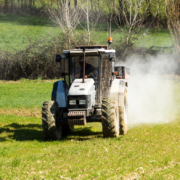Research Identifies Agricultural Liming as Potential Carbon Dioxide Sink
A team of researchers from the Yale Center for Natural Carbon Capture at Yale University presented findings at the Goldschmidt Conference in Prague, indicating that adding lime to agricultural soils can remove CO2 from the atmosphere. Ordinarily, when lime is added to soil, it reacts with carbonic acid to create bicarbonate, calcium, and magnesium. If there are strong acids present in the soil, such as nitric or sulfuric acid, these will react with the bicarbonate to create carbonic acid and release CO2. Consequently, liming is commonly viewed as increasing release of CO2, but this research showed that the addition to the soil of acids in the form of fertilizer and pollution from fossil fuel use drives this process. The modeling conducted through this research showed that if soil acidity is neutralized prior to liming, the addition of lime actually results in the storage of CO2 in the soil, in the form of bicarbonate, in addition to increasing crop yields.


 USDA Photo by Lance Cheung.
USDA Photo by Lance Cheung. USDA photo by Lance Cheung.
USDA photo by Lance Cheung.